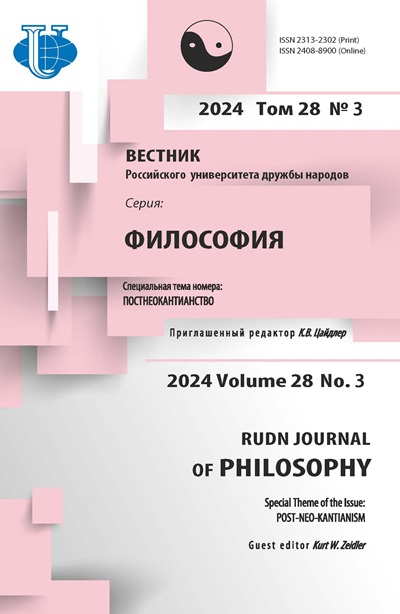Буддийская философия и неогегельянство в компаративной аналитике С. Дасгупты
- Авторы: Бурмистров СЛ1
-
Учреждения:
- Санкт-Петербургский государственный университет
- Выпуск: № 2 (2008)
- Страницы: 32-42
- Раздел: Статьи
- URL: https://journals.rudn.ru/philosophy/article/view/11329
Цитировать
Полный текст
Аннотация
В статье рассматриваются взгляды современного индийского историка философии С. Дасгупты на типологические связи между древнеиндийской философией и западным идеализмом, а именно - между буддизмом и неогегельянством Б. Кроче. Анализируется понимание Дасгуптой буддизма как реакции индийской культуры на ритуализм Вед и Упанишад, а учения Кроче - как реакции на, с одной стороны, гегелевский идеализм, а с другой - на растущее влияние позитивизма в европейской философской культуре. Исследуется понимание Дасгуптой сущности философии как формы рациональной деятельности, осуществляющейся во всех культурах и в любую эпоху одинаково и подчиняющейся одним и тем же законам, что делает возможным компаративистское исследование философских воззрений, формировавшихся в разных культурах.
Об авторах
С Л Бурмистров
Санкт-Петербургский государственный университетКафедра истории философииФакультет философии и политологии; Санкт-Петербургский государственный университет
Список литературы
- Dasgupta S.N. A History of Indian Philosophy. Vol. 1. - Cambridge: Cambridge University Press, 1951.
- S.N. Philosophical Essays. - Calcutta: Calcutta University Press, 1941.
- Gennaro A.A. de. The Philosophy of Benedetto Croce. - N.Y.: The Citadel Press, 1961.
- Orsini G.N.G. Benedetto Croce. Philosopher of Art and Literary Critic. - Carbondale: Southern Illinois University Press, 1961.
- Андросов В.П. Будда Шакьямуни и индийский буддизм: Современное истолкование древних текстов. - М.: Восточная литература, 2001.
- Гегель Г.В. Ф. Наука логики. - СПб.: Наука, 2002.
- Гуссерль Э. Картезианские размышления / Пер. с нем. Д.В. Скляднева. - СПб.: Наука, 2001.
- Категории буддийской культуры. - СПб.: Петербургское востоковедение, 2000.
- Косич И.В. Критика абсолютного идеализма Ф.Г. Брэдли (проблема реальности): Автореф. дисс. ... канд. филос. наук. - М., 1989.
- Кроче Б. Антология сочинений по философии / Пер. с ит. С.А. Мальцевой. - СПб.: Пневма, 1999.
- Мальцева С.А. Философско-эстетическая концепция Бенедетто Кроче: Диалог прошлого с настоящим. - СПб., 1996.
- Махаяна шраддхотпада шастра (Трактат о пробуждении веры в махаяну) / Пер. с кит. Е.А. Торчинова // Буддизм в переводах. Вып. 2. - СПб.: Андреев и сыновья, 1993.
- Реале Дж., Антисери Д. Западная философия от истоков до наших дней. - СПб.: Пневма, 2003. - Т. 4.
- Чаттерджи С., Датта Д. Индийская философия / Пер. с англ. - М.: Селена, 1994.
- Шохин В.К. Пурушартха // Универсалии восточных культур. - М.: Восточная литература, 2001.
- Эфиров С.А. Итальянская буржуазная философия ХХ века. - М.: Мысль, 1968.
















